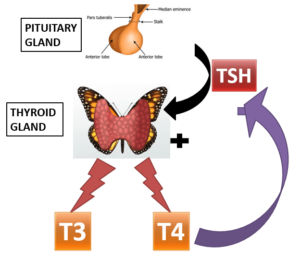What is hypothyroidism?
There is a gland in your neck called the thyroid gland. It makes thyroid hormone. This hormone controls how the body uses and stores energy ie the metabolism of the body.
Hypothyroidism is the condition when a person does not make enough thyroid hormone i.e T3 and T4 and hence the TSH is high.
What hormones does the thyroid produce?
The thyroid gland produces two hormones mainly T3 and T4 which is under the control of a hormone TSH that the pituitary secretes and controls the thyroid gland production. However, once the body has optimum T3 and T4 they give a negative feedback signal to stop the TSH. This is what is known as a negative feedback regulation.
What are the symptoms of hypothyroidism?
Some people with hypothyroidism have no symptoms. But most people complain of feeling excessively tired or fatigued. This is what makes it challenging to diagnose as this is a very vague symptoms.
Other symptoms of hypothyroidism include:
- Lack of energy
- Hair loss
- Feeling cold easily
- Feeling constipated (having too few bowel movements)
Weight gain, hoarse or thick voice and even depression and memory issues are known to occur with hypothyroidism.
Can hypothyroidism lead to heart issues?
If it is not treated, hypothyroidism can also weaken and slow your heart rate. This can make you feel out of breath or tired when you exercise and cause swelling (fluid accumulation) in your ankles. Untreated hypothyroidism can also increase your blood pressure and raise your cholesterol – both of which increase the risk of heart trouble especially heart failure.
Can hypothyroidism lead to infertility and conception issues?
In women, hypothyroidism can disrupt monthly periods. It can also make it hard to get pregnant. In women who do get pregnant, hypothyroidism can cause problems. For instance, it can increase the chances of having a miscarriage especially in severe state of deficiency.
How is hypothyroidism treated?
Treatment for hypothyroidism involves taking thyroid hormone pills every day. After you take the pills for about 6 weeks, retest your blood to make sure the levels have normalised. They might readjust your dose depending on the results. Most people with hypothyroidism need to be on thyroid pills for the rest of their life.
Can the thyroid pill harm me?
Never change your dose of thyroid hormone on your own. Taking too much thyroid hormone can cause heart rhythm problems and even damage your bones. Hence test regularly as your doctor advices and take doses accordingly.
What if I want to get pregnant?
Yes, once your thyroid levels are normal you can always plan pregnancy. Always inform your doctor about it so that the treatment can be optimised as per the recent recommendations and norms.
Your doctor will most likely change your dose of thyroid hormone once you are pregnant. That’s because you need more thyroid hormone during pregnancy. They will also measure your levels of thyroid hormone 4 weeks after any change in your dose, and at least once during each trimester of pregnancy.

